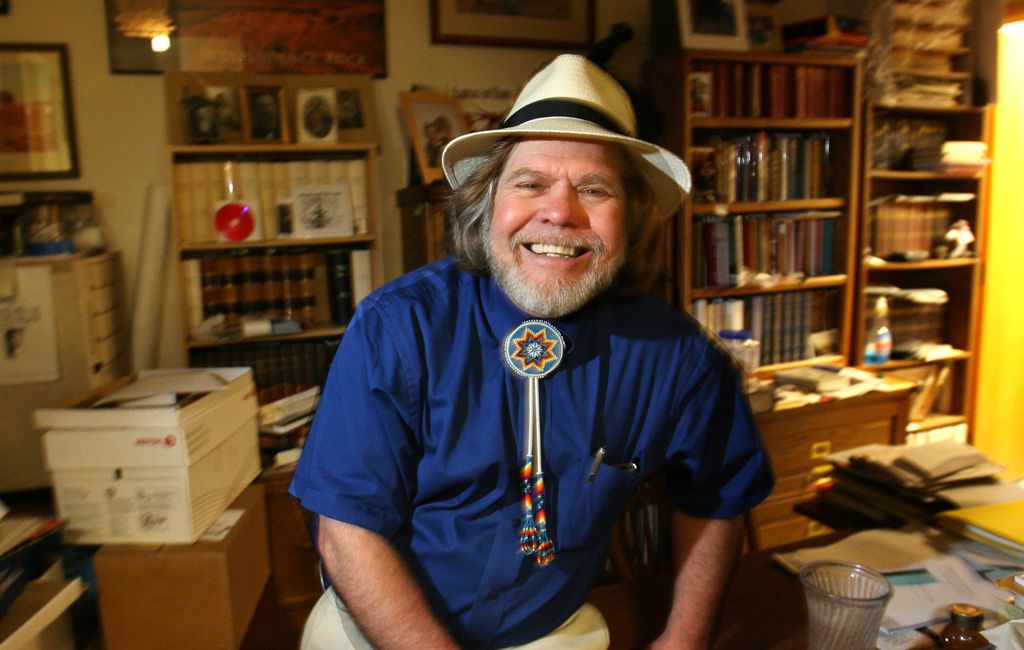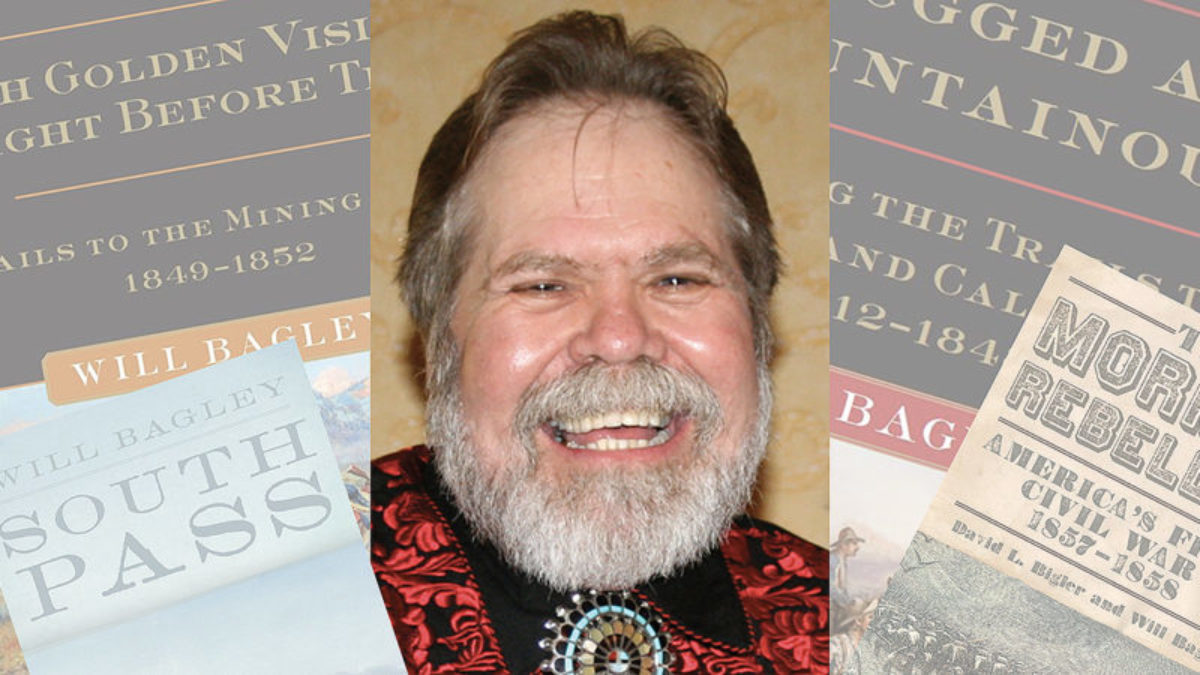Date: November 4, 2019 (Season 1, Episode 1; 35:31). Click here for the Buzz Sprout version of this episode. The photo montage is courtesy of Will Bagley’s pubisher. Are you interested in other episodes of Speak Your Piece? Click here for more episodes.
PODCAST CONTENT:
Will Bagley was my first guest on this podcast, recorded on November 4, 2019. I was working out the format, length and more, and invited Will who I had known for twenty-five years, to speak about the value of history framed by Utah’s often complex stories.
Among many broad ranging ideas mentioned by Bagley, in this interview he reflects on the idealism and the accomplishments of the American 20th century, including what he describes as “revolutions,” revolutions in expanding rights: civil rights, women’s rights, LGBTQ+ rights, etc. He concludes that expanding rights, including inclusiveness, equity, and compassion, has made better public policy than inequity, bigotry and exclusion.
On September 28, 2021, after suffering a series of strokes, Will passed away. The Speak Your Piece team now offers this candid previously released conversation with one of Western history’s most well known historians, who was, depending if you were “fur’m or agin’um,” either a beloved figure or a “burr under the saddle.”
PODCAST EPISODE:
Will had a deep commanding baritone voice. He wore bolo ties, brightly colored suspenders and hats; lots of hats, fedoras, panamas and wide brim straw hats, omitting warmer weather, when he donned shorts, a Hawaiian shirt and baseball caps.
Small in stature though a giant in intellect, Bagley was a journalist turned western historian and public intellectual, who could be funny and warm, then blunt, quick-witted and acerbic. To many he was a contrarian, someone grinding an axe against his Mormon kin and culture. Maybe. However, to my way of thinking, it was more a response to overly idealized history, the outcomes of unchecked power and even hypocrisy. He was fearless in declaring his views, in a society that encouraged primness and orderliness. Will was outspoken, boisterous in loud laughter and wickedly full of life.
Will rarely doubted the accuracy of his views, he was an evangelist for the wide ranging historical subjects he researched and interpreted. He was an activist historian of sorts (publishing or editing a dozen or more books), and with his commanding presence, he was sought after to speak, especially by the Press. What I will miss most is his unflinching moral conviction regarding the power of history, being regaled by his off the cuff stories and finally, the schadenfreude I felt when historians braced themselves for Will’s ironic quips or difficult questions from the back of the room.
Brad Westwood, Host of Speak Your Piece

Bio: Will Bagley is an author, co-author and editor of over twenty books, Will was as Western, Utah and Mormon history. Previously a technical writer and Salt Lake Tribune journalist, (best known for his column “History Matters,” 2000–2004), he was a sought-out speaker, presenter and public intellectual. Born in Salt Lake City, raised in southern California, Bagley wrote some of Utah’s most hard hitting history including Blood of the Prophets (2002) that triggered the LDS Church History Department’s deep and long re-examination of Utah’s Mountain Meadows Massacre (1857). In 2014 the Utah State Historical Society made Bagley a Fellow, its most prestigious honor. Photo Credit: Salt Lake Tribune
TOPICS IN TIME:
PART ONE & PART TWO COMBINED:
- 00:00 – 10:33 Western Historian Will Bagley shares how he defines History. Bagley expresses how history is about time, it is about heritage, the stories we tell as human beings and it is part of our collective memory. Stories create identity, they make us know who we are and where we came from.
- 10:33 – 17:30 Bagley and Westwood discuss how Mormonism was founded in the age of newspapers; history was in the forefront of its creation. They both discuss why history is a religious issue in Utah.
- 17:30 – 21:27 Bagley argues that history is actually made by ordinary people who are just trying to do their best by their families instead of the perceived male based history and the worship of power. A common attribute of human history is the search for wanting a better life for our families and communities.
- 21:27 – 35:33 Will Bagley describes his dream of becoming a notable Utah historian and how he was able to do so without an academic doctorate degree. Even so, Bagley has produced over 20 volumes of monumental history and contributed hundreds of articles to the Salt Lake Tribune. Bagley explains the phrase “wishful history”, a constructed history that we wholeheartedly want to be true.
- 35:33 – 49:44 What are some traits that all sub histories have in common? Bagley answers his own question by stating that time is the common factor because we are all caught up in time and subject to its cycles. The concept of presentism is introduced in this segment; how history is framed through this moment in time, from this place, from this vantage, from these biases, and from this point. Through his historical presentism, Bagley narrates his lived experiences in the United States and his family history in connection to the broader American narrative.
- 49:44 – 1:00:40 Evidentiary history is the idea of pursuing the facts. Bagley believes this is a massive simplification, he explains the differences between European models of research vs. American models. Great historians know and accept when they might be wrong. All evidence cannot be examined the same way, there might be biases or hidden motives in the historical documents.
- 1:00:40 – 1:09:46 We write history from this moment in time. Future generations will see our present differently than how we see it. History never ends, it is continuously raising challenges and questions. How do we address the past honestly? It is not about what you write but about what you don’t leave out. In this last segment, Will Bagley tells audiences that history is not revealed but instead created.
ADDITIONAL RESOURCES AND READINGS:
- A list and links to the publications Bagley has authored, co-authored or edited can be found on his Wikipedia page.
- To buy a copy of one of Will Bagley’s most recent books, go to The Whites Want Everything (2020) (which seeks to restore Native voices to the history of colonization of the American Southwest and to America’s Great Basin) or purchase and read personal story by Bagley entitled: River Fever: Adventures on the Mississippi, 1969-1972.
Do you have a question or comment, or a proposed guest for “Speak Your Piece?” Write us at “ask a historian” – [email protected]

